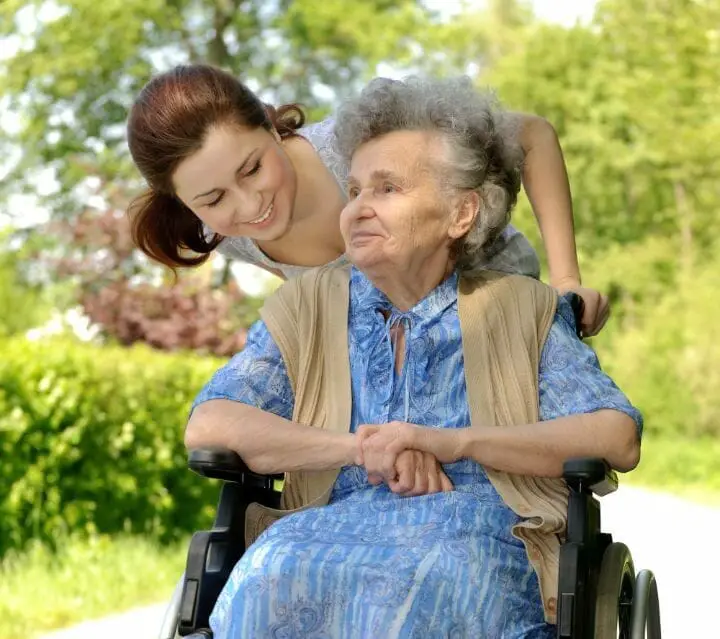Making the decision to live in a nursing home comes down to how much care an elderly person needs, in medical or basic living terms. However, can living at home provide the same care, if you hire an assistant?
Both have pros and cons. The price of a nursing home may block that option altogether. Or living at home may be comfortable and moving out may be difficult.
COVID may put the elderly at a risk in residential homes, as nurses come in and out.
So, how do they differ? Nursing homes provide daily care that helps the elderly with medical needs. In contrast, living at home provides independence if they are able to.
Can hire a caregiver to live at home, (assistant living) and reap the benefits of a nurse’s responsibilities but in the home instead of a nursing home if affordable.
Types of Nursing and Residential Care Facilities
The types of residential care facilities outlined below are a nursing home, living at home, and assistant living. Each slightly differ from one another due to the independence or interdependence of a care worker.
Nursing Home
a nursing home provides a wide variety of medical and personal services to elderly residents to fulfill their basic daily needs and assist their mental or physical health when necessary. These benefits include:
- Superb Medicare. For elderly patients who moved from the hospital, and cannot live at home)
- Personal services. Meal preparation, assistance with mobility (i.e wheelchair)
- Supervision. 24-hour supervision for help ready at their service
- Physical therapy. Helps with any body aches or pains with specific stretching
- Speech therapy. For help with speech impediments or trouble speaking with old age
Living at Home
This is ideal for the elderly who strive to live independently and who want and can take care of their own needs. They are comfortable living in their own home – however, may benefit from having a partner or an assist worker to keep them company.
- Independence. If the elderly person doesn’t need extra care, they can live at home to take care of themselves. (However, if one lives alone the social aspect may improve their mental health in a nursing home)
- Cost-effective. Nursing homes can cost more than they can afford. Would strain or be impossible if paying off their home is all is acceptable.
- Freedom. No strict schedules from nursing home facilities. Can play games or eat meals on their own time frame.
- Comfortable. Change may be hard if they love their living situation. Remaining in a familiar place may be most beneficial for their mental health.
- Personal belongings. Some personal belongings may not be able to transfer to a nursing home. Can keep them in the places they want.
You might also like How to Protect Your Assets From Nursing Home Care
Assistant Living
Living at home and hiring a caregiver to assist with the elderly’s basic needs, such as dressing them, cooking, or bathing. If one has the funds, they can live in an assisted facility with nursing assistants to check in daily.
- Assisted living. Hiring a caregiver for elderly persons who do not need extra care a nursing home provides.
- Personal assistant. Either in the home or at an assisted care facility, the caregiver will provide prepared food, assist with medication, and mobility support (i.e, helping them walk or bathing)
- Still remain independent. Elderly assistants care for their basic needs and daily activities. The elderly are allowed to partake in any activity they want at any time.
- Sleep at home. Residents sleep in their own rooms, usually without someone supervising or checking in on them 24/7.
What are the Advantages to Each?
Nursing Home
Improved Mental Health: Social Environment
The major advantage of living in a nursing home is having social support rather than living alone. A study showed that the social environment of each of the units played a fundamental role in the residents’ quality of life.
Further studies showed that there were three main advantages to living in a nursing home.
- Independence, unity, and good health care are related to well-being in elderly living in nursing homes.
- Nursing home residents may try to get along with staff due to the fear of a withdrawal of support.
- Social support from visitors outside the nursing home may decrease the need for social support from resources in the nursing home. (Follow COVID rules)
Lastly, meals are prepared, and activity event nights are planned for the elderly to reap in the social environment benefits.
In terms of price, the costs of residential care (nursing or assistant facility) versus home care shows that the latter is more costly for elderly people.
People who are elderly basically feel happy in residential care. Other than the state, remaining stakeholders, have benefits if they live in residential care.
Through this research, it’s up to the elderly person if they can afford residential care and if they want to be taken care of. Thus, will get their socialization needs met to sustain good mental health.
Physical Health Care: Improved Mobility
In one study of 83 patients with a mean age of 79 in a clinical day hospital, researchers found the EMS was significantly more likely to detect an improvement in mobility following a course of physiotherapy.
Some nursing care homes have physiotherapists to stretch the elderly patients’ bodies. Thus, preventing body aches and improving daily mobility such as walking and arm movement.
If they are struggling with a body disease physiotherapy can help
Living at Home
Save Money
The number one advantage of living at home is saving money. Some people didn’t save enough for a retirement fund and live comfortably at home financially.
Or, they live with a partner and don’t need to socialize with other elderly people as much as someone living alone would benefit from.
Besides, a nursing home in Canada is up to 3,000 or more a month – that many elderly people don’t have the option to pay for.
Safer Measures
Right now with COVID, there are nurses that come in and out of the nursing home, putting the elderly at a high risk of catching the virus.
A major advantage of living at home is feeling as safe as possible, in the comfort of their own home. They can order groceries on an app for extra security health-wise and cook for themselves.
Being able to take care of themselves requires enough mobility to cook, dress themselves, and bathe. The elderly person doesn’t have to worry about catching the virus if a nurse in a residential home helps them, even if they got tested negative.
Studies show that the sensitivity to detect COVID-19 of real-time (RT)-PCR is reported to be lower than that of chest CT
CT findings cannot distinguish clearly between viral and COVID-19 pneumonia.
Assistant Living
Taken care of in own home
The biggest advantage of using an assistant to take care of the elderly person is being able to stay in their own home. However, this comes with costs as well equating to a residential home monthly fee if the caregiver moves in with them (live-in caregiver).
If they check in weekly, though it would be less money and ideal for elderly persons who only want their basic needs met. Also, if they don’t need a person to be there at all hours of the day.
Assistant Living Program (ALP)
An excellent alternative to nursing homes for seniors who need assistance with their daily responsibilities.
Government program helps the elderly in need of nursing level of care delay placement in a nursing facility by helping to pay for support services in an assisted living environment. Services include:
- Personal care activities
- Room and board
- Care management by registered nurses
- Adult daycare
- Physical therapy
- Medical supplies and equipment
This assistance program includes skilled nursing services that come from an outside agency. This program accepts Medicaid, Supplemental Security Income (SSI), and home relief recipients.
Independence intact
Some elderly people may feel uncomfortable with a caregiver living with them. It may make them feel suffocated in their own home. This is only needed for those who need care 24/7 and constant check-ins like a nursing home would provide.
Elderly people can thrive engaging in their own desired activities if they are able to. Research shows technology helps elderly people live alone just fine.
The benefits include food delivery services on an app (Such as Instacart) or downloading a monitoring app to connect with family members to check in on them to visit if needed.
Addressing the Controversy
Many elderly people may feel bad about not choosing a residential home like they are expected to.
Some have different needs socially, physically, and mentally. But, can feel guilty if they do not conform to societal expectations of living in a facility to be taken care of – like majority of elderly people do.
Not having enough money when the elderly person needs nursing care the most, can put strain on the family or loved ones to take care of them. Thus, putting pressure on the family to pay for their health care when they are already juggling finances in their own lives.
Hiring an at-home caregiver is ideal for those wanting a cheaper route for meeting at home living basic needs.
Things to Know about Nursing homes vs Home Living
Research showed that nursing homes provide enough care to lengthen lives.
Among elderly persons who died in 1986 who had ever spent time in a nursing home, the percentage with five or more years of lifetime use increased with age.
Those who survived to very old age were particularly likely to have spent large amounts of time in nursing homes.
For example, among persons who entered nursing homes, 42 percent of those who survived to the age of 95 resided in a nursing home for a total of five or more years, as compared with 9 percent of those who died at 65 to 74 years of age.
More research has shown that having a partner can also make you live longer. Some benefits of living at home with a partner include:
- Longer life
- Fewer heart attacks and strokes
- Less depressive life
- Less chance of advanced cancer at the time of diagnosis and more likely to survive cancer for a longer period of time
- May survive a major operation more often
This doesn’t mean that just being married automatically provides these health benefits. An unhappy marriage can make things worse.
The amusing fact is health benefits are more in men than women who are married.
So, if an elderly person lives alone, the difference in mental health is astounding in comparison to those surrounded by loved ones.
Singles, especially single elderly persons are more likely to feel depressed without a support system that a residential home provides. Just costs some extra cash for this included health benefit.
Summary
In this article, we have outlined the major benefits for each living route. Research suggests that living in a nursing home may provide mental health benefits on top of physical health needs being met.
Research also suggests living with a partner at home has mental health benefits. Thus, elderly people can save money if they don’t need extra care.
To sum, nursing homes provide long term care that helps the elderly with medical needs. In contrast, living at home provides independence if they are able to.
Can hire a caregiver to live at home, (assistant living) and reap the benefits of a nurse’s responsibilities but in the home instead of a nursing home if affordable.
Comment below if these tips resonate with you. Share to a loved one you know who is deciding which facility suits their needs and finances the best.








